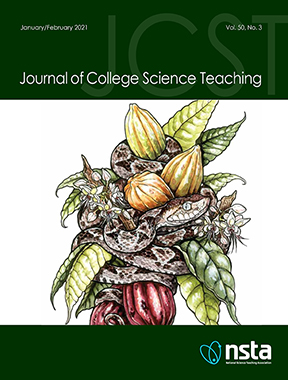Journal of College Science Teaching—January/February 2021

Volume 50, Number 3
In this issue, “Practice Makes Better: A Classroom Investigation of Practice Effects” features an answer to the age-old question that students ask, “Why do we have to do this over and over again?” through the use of the Seeker Game. Our other Feature article, “Incorporating Programming, Modeling and Data Analysis into an Introductory Biology Course”, shares unit examples which make quantitative data more relevant and engaging in an introductory biology course. And the article by Christine O'Donnell takes an in-depth look at integrating students’ worldviews within an introductory astronomy course.
In the Research and Teaching column you will find: an interesting investigation into the efficacy of using preconceptions using a groundwater instructional sequence; a study of pre-service teachers’ knowledge and attitudes towards wind energy education; a timely piece comparing face-to-face Peer-Led Team Learning vs. Cyber Peer-Led Team Learning; the use of Primary Literature in Undergraduate Science Courses; and an interesting look into mediation of collaborative work.
The Two-year Community column article showcases a truly interdisciplinary/team-taught course to inform and motivate student learning utilizing a unit on sustainability. In the POV, Patrick Cafferty shares an innovative idea for connecting with your students.
View the full Digital Edition:
http://digital.nsta.org/view/nsta/jcst/january-february-2021
Journal Article
Taking the Office Hour Out of the Office
Science classrooms across our campus have changed dramatically over the past 10 years as an increasing number of instructors have incorporated a variety of active learning techniques into their teaching practice, using, for example, classroom respons...
By Patrick Cafferty
Journal Article
Sustainability, Energy, and the Green Economy
Interdisciplinary education offers a collaborative approach to multifaceted topics, such as environmental sustainability. In this article, we present the conceptual framework and lessons learned from a team-taught course, entitled Sustainability, Ene...
By Monika Sikand, Claudio Mazzatenta, Keith Wong, Joseph Bush, and Aaron M. Socha
Journal Article
Practice effects are ubiquitous human phenomena that have been scientifically studied for over half a century. They are also among the most directly applicable psychological phenomenon, holding broad implications for any domain involving human expert...
By Jeff Shrager
Journal Article
Incorporating Programming, Modeling, and Data Analysis Into an Introductory Biology Course
This paper describes an introductory biology course for undergraduates that heavily incorporates quantitative problem solving in activities and homework assignments. The course is broken up into a series of units, each organized around a motivating b...
By Eliot C. Bush, Stephen C. Adolph, Matina C. Donaldson-Matasci, Jae Hur, and Danae Schulz
Journal Article
Whether to engage student preconceptions to facilitate conceptual change is an area of debate among conceptual change theorists. Here, we evaluate the efficacy of a preconceptions-based instructional sequence about groundwater previously described by...
By Leilani A. Arthurs, Justin Elwonger, and Chelsie M. Kowalski
Journal Article
The purpose of this study was to investigate knowledge and attitudes of preservice teachers toward wind energy education. The participants for this study were preservice teachers enrolled in a science methods for teachers course. The preservice teach...
By Mamta Singh
Journal Article
Implementing Peer-Led Team Learning and Cyber Peer-Led Team Learning in an Organic Chemistry Course
Peer-Led Team Learning (PLTL) is a small-group, collaborative problem-solving model that has significantly increased student performance in a variety of chemistry undergraduate courses and other STEM courses. Cyber Peer-Led Team Learning (cPLTL), an ...
By Sarah Beth Wilson and Pratibha Varma-Nelson
Journal Article
Primary Literature in Undergraduate Science Courses
Primary literature—consisting of novel peer-reviewed articles and conference proceedings—has been associated with several positive outcomes for students within undergraduate science courses. Primary literature is the principal method of written s...
By Jeremy David Sloane
Journal Article
What to Expect With Group Work
Instructors who wish to take advantage of the benefits of collaborative group work often hesitate over concerns about conflict or problems that arise between students. There are no estimates of the level of conflict that can be expected even if best ...
By Peggy Brickman, Austin Lannen, and Jill Beyette
Journal Article
General education college astronomy courses offer instructors both a unique audience and a unique challenge. For many students, such a course may be their first time encountering a stand-alone astronomy class, and it is also likely one of the last sc...
By Christine O’Donnell, Edward Prather, and Peter Behroozi


